The 26th Governing Council of UN-Habitat highlights the role of local and regional governments in the implementation of the New Urban Agenda
11.05.2017
From 8-12 May a delegation of local leaders lead by UCLG and networks of the Global Taskforce participated in the 26th Session of the Governing Council of UN Habitat, the first since the adoption of the New Urban Agenda in Quito in October 2016.
From 8-12 May a delegation of local leaders led by UCLG and networks of the Global Taskforce participated in the 26th Session of the Governing Council of UN Habitat, the first since the adoption of the New Urban Agenda in Quito in October 2016.
The week kicked off on 8 May with a side event organized by UCLG and the Global Taskforce on the role of local and regional governments in the implementation of the New Urban Agenda in connection with the global agenda 2030.
Local and regional governments worldwide and their networks are committed to ensuring the implementation of the SDGs, Climate Change and the New Urban Agenda. Local and regional governments are already taking action to adapt these agendas to local and regional levels of governance, the process of ‘localizing’ the global agendas.
The side event highlighted the social function of housing and its role in making the Right to the City a reality and shifting from housing from being seen as commodity to a human right.
The event celebrated the important partnerships developed with the framework of Habitat III process, including the establishment of General Assembly of Partners (GAP). Participants stressed the need to team up to make the connection between the SDGs and Habitat III a reality.
The important participation of the GAP constituencies and their valuable contributions to the debate proved the importance of multi-stakeholder partnerships. Participants highlighted the necessity of civil society’s trust and support to show local governments the way and hold them accountable.
UN Habitat reaffirmed its support for the action of local and regional governments, which will be essential to ensure that urban and territorial development are placed at the heart of the political agenda.
CEMR and Platforma organized a side-event on the Covenant of Mayors in Sub-Saharan Africa (CoM SSA) as a concrete exemple of “Decentralised Cooperation for an effective implementation of the New Urban Agenda”. Led by CEMR with the support of a number of organisations, including UCLG Africa, the CoM SSA initiative aims at being a sound framework for city action on climate change and renewable energy.
As such it represents an essential tool for the effective implementation of the New Urban Agenda through city-to-city cooperation, practical solutions and access, including financial to best and replicable practices in sustainable urban development. The case study of the City of Lumumbashi, a pilot city of the initiative was shared as well as the perspective of intermediary cities.
UN Habitat Governing Council High-Level Segment
On 9 May, Mayor of Durban, Zandile Gumede, spoke in the High-Level Segment of the UN Habitat Governing Council on behalf of UCLG and the Global Taskforce. 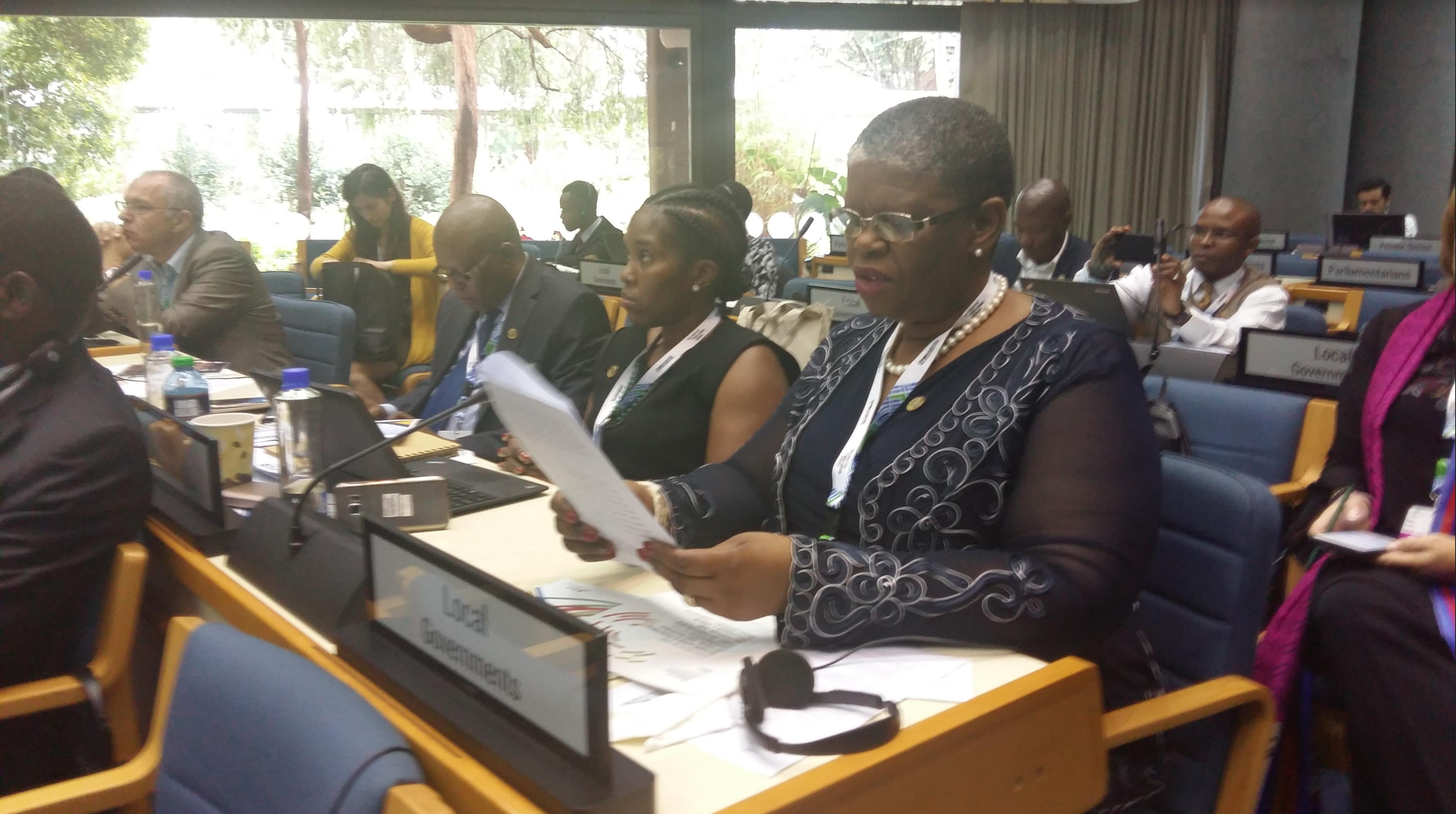
In her intervention, Zandile Gumede emphasized that the New Urban Agenda should act as the framework for the achievement of the global goals, from the SDGs to the Paris Agreement and the Sendai Framework. This will require decentralization according to subsidiarity and a multi-level governance approach.
Zandile Gumede closed her intervention with a call for the framework for implementation of the New Urban Agenda to go beyond a technical 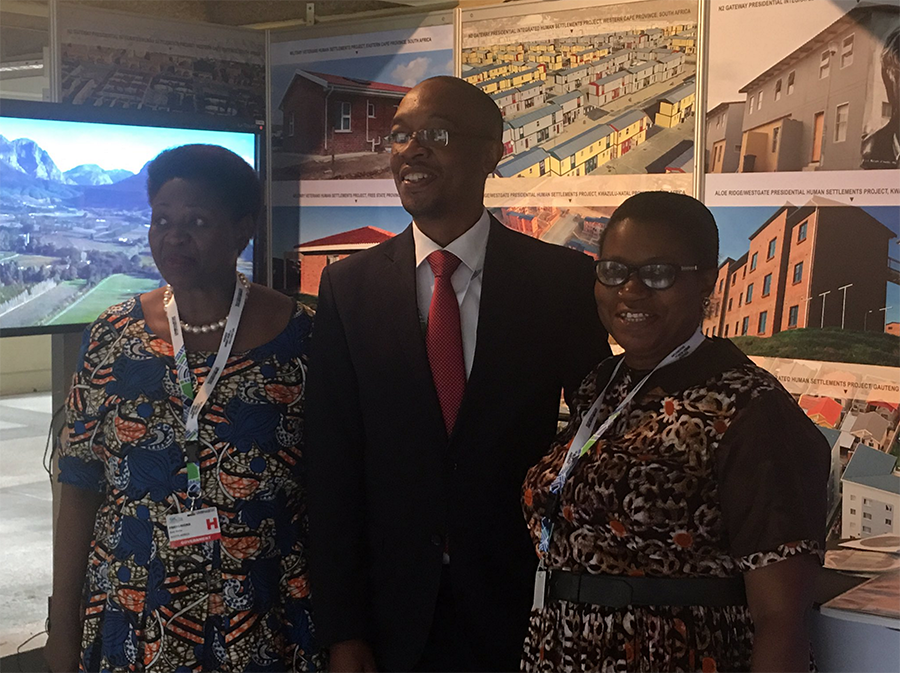 planning guide and address the social aspects of the New Urban Agenda. It should, he said, consider local and regional governments as more than simple implementers of national priorities but, rather, as partners responsible for integrated territorial development.
planning guide and address the social aspects of the New Urban Agenda. It should, he said, consider local and regional governments as more than simple implementers of national priorities but, rather, as partners responsible for integrated territorial development.
UCLG President, Parks Tau also addressed the High Level segment and argued that “local and regional governments are on the front line of guaranteeing the right to adequate housing,” and defended housing as a right and a social good within the framework of a Right to the City approach.
Dialogue between governments, local authorities and other partners
On 10 May, a dialogue was held between Member States, local authorities and other partners, with a view to increasing the participation in and contribution by local authorities and other partners to the work of the Governing Council.
Speaking on behalf of UCLG and the Global Taskforce, Deputy Secretary General of UCLG, Emilia Sáiz, recalled the central role of local and regional governments in the implementation of the New Urban Agenda. She acknowledged the ongoing support from UN Habitat in developing and 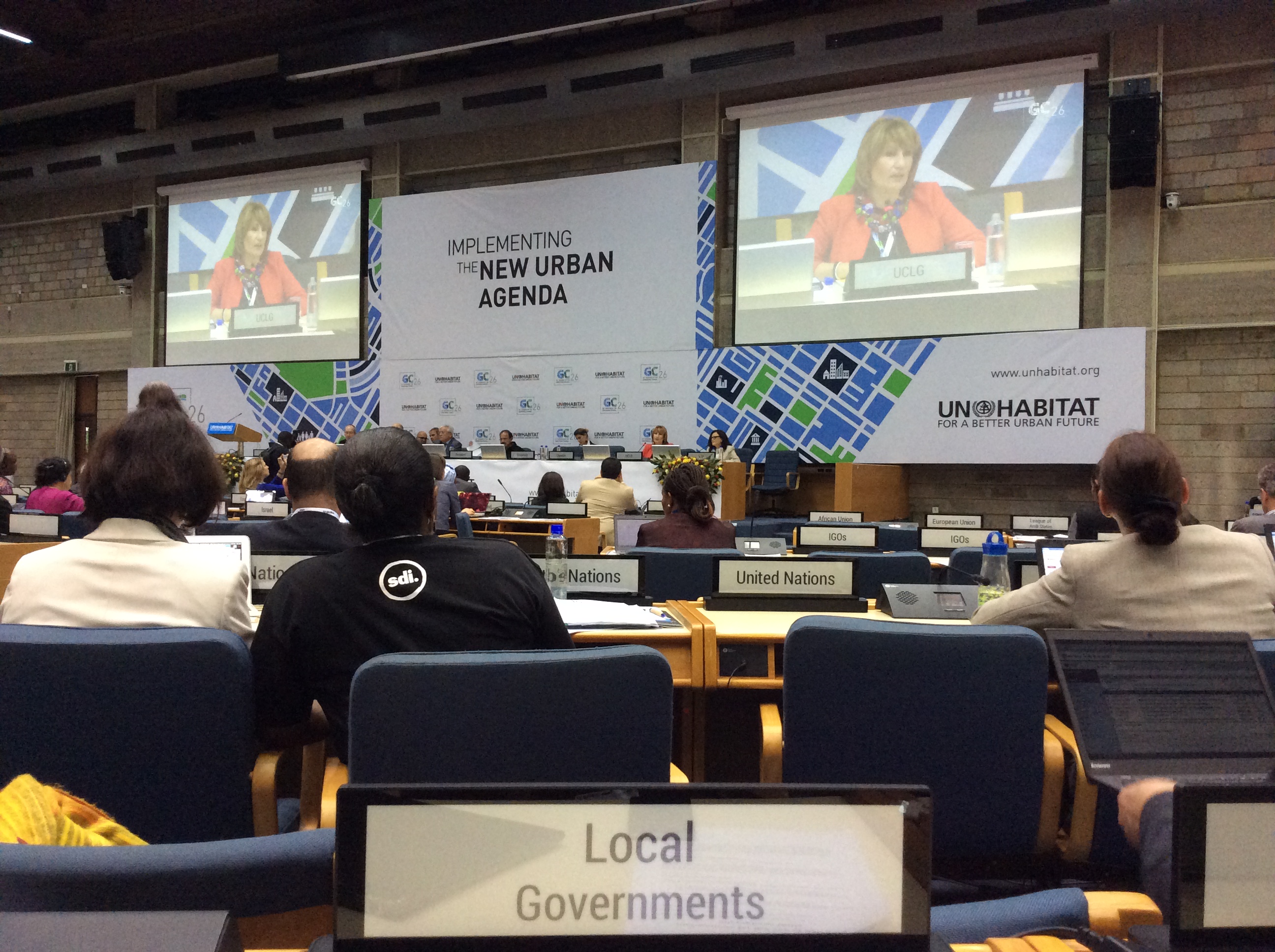 strengthening local and regional government organizations and the development and implementation of local action to achieve the global agendas.
strengthening local and regional government organizations and the development and implementation of local action to achieve the global agendas.
Emilia Sáiz praised the successful partnerships during the Habitat III process, which had a powerful impact on the outcomes of the negotiations. She called for their continuation and strengthening in the implementation phase of all the recently adopted global agendas, stressing their interdependence. She argued that it would be particularly necessary to support the convening work of the General Assembly of Partners (GAP) to bring together all the constituencies of civil society and beyond (local governments) and the powerful mobilization of local and regional government representatives as part of the Global Taskforce.
Integrated human settlements planning for sustainable urbanization
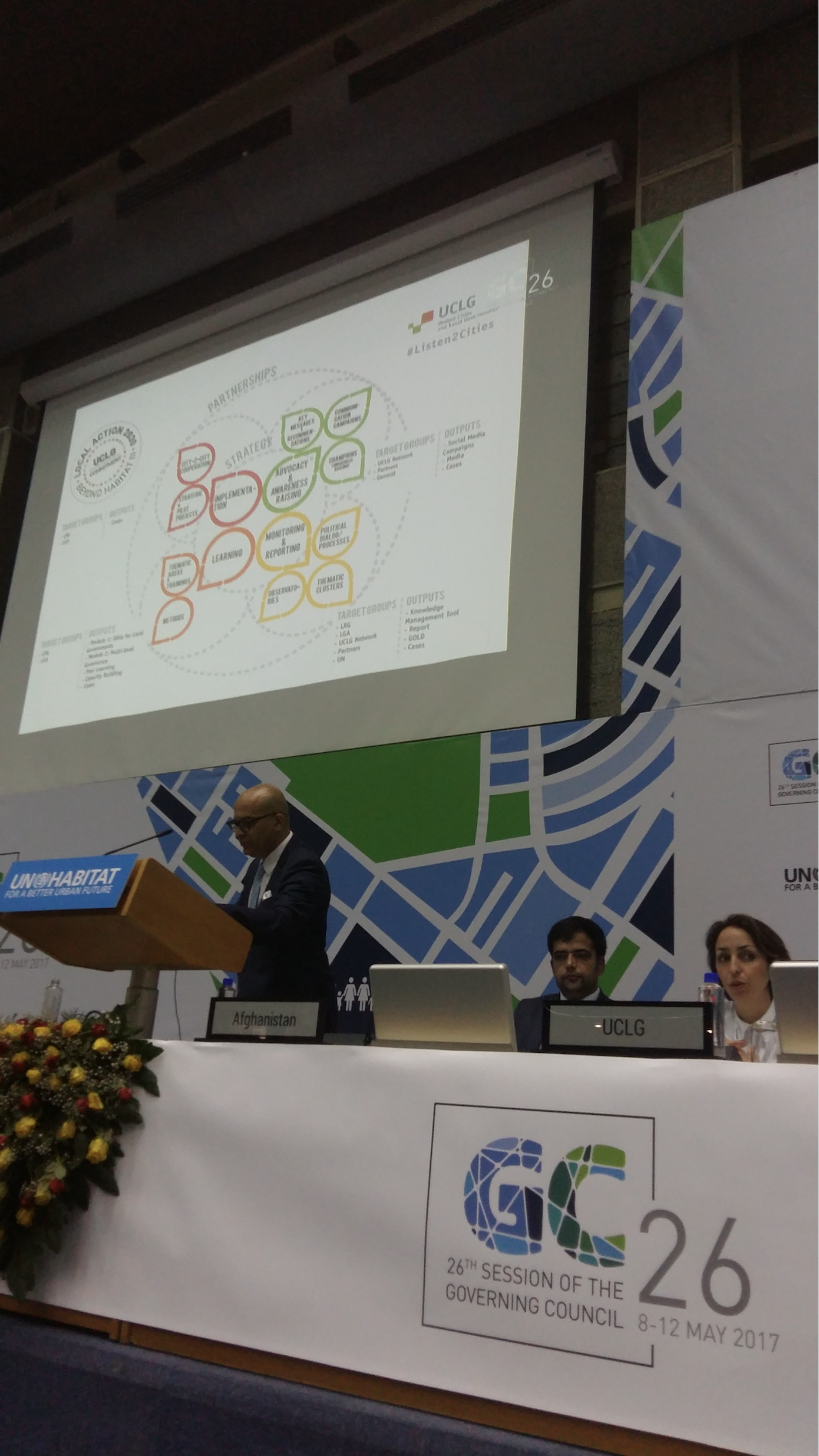 Firdaous Oussidhoum, advisor of the Mayor of Chechaouen and on behalf of the UCLG Working Group on Intermediary Cities, took part in the second thematic panel of the Dialogue session between governments, local authorities and other Habitat Agenda partners on the special theme of the 26th UN-Habitat Governing Council, which focused on integrated human settlements planning for sustainable urbanization.
Firdaous Oussidhoum, advisor of the Mayor of Chechaouen and on behalf of the UCLG Working Group on Intermediary Cities, took part in the second thematic panel of the Dialogue session between governments, local authorities and other Habitat Agenda partners on the special theme of the 26th UN-Habitat Governing Council, which focused on integrated human settlements planning for sustainable urbanization.
She highlighted the need to go beyond the technical operational criteria and to include a human approach in urban planning. She also presented the tool used by the UCLG Working Group on Intermediary Cities for sustainable urbanization planning.
Finally, she took the opportunity to present the first World Forum on Intermediary Cities, which will take place in Chefchaouen in May next year, and invited the audience to participate in this important event.
Synergies and financing for sustainable urbanization
The Secretary General of CEMR, Frédéric Vallier, participated in the third thematic panel of the Dialogue session, which focused on synergies and financing for sustainable urbanization.
He highlighted the enormous responsibility that urban local authorities hold in sustainable management and the need to evolve towards a greater recognition of the huge demands growing cities face in terms of housing, basic services and resilient infrastructures. 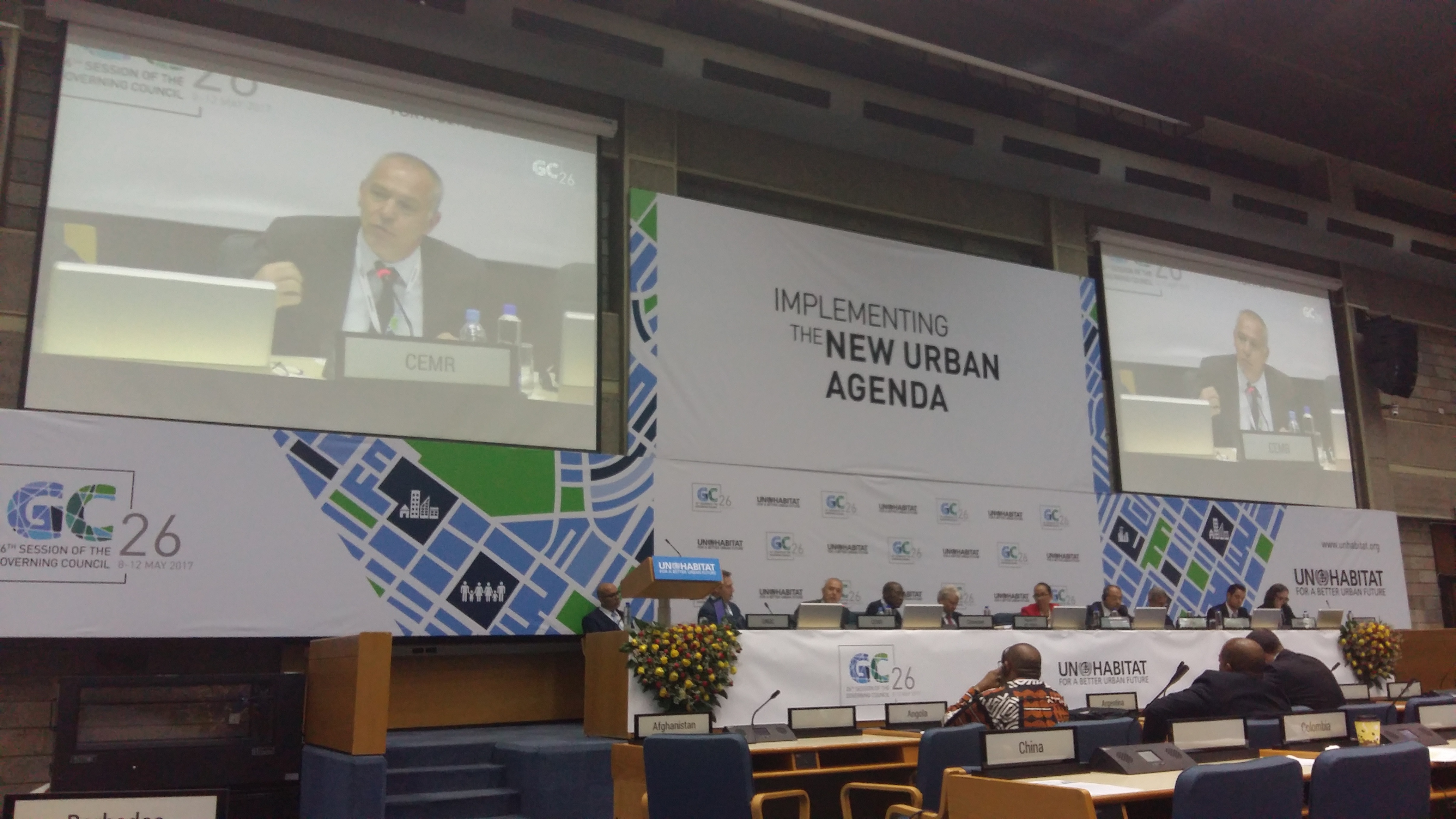
He further stressed that national governments and financial institutions need to support local governments in their efforts to mobilize revenues in order to tackle the lack of financial and technical capacity of local governments that conveyed the low level of achievement of the MDGs.
He concluded by stating that sustainable local and urban development is an opportunity for global transformation both for developed and developing countries if understood as a territorial agenda with the interest of the communities at heart.
More information:
- Follow the conversation on Twitter using #Local4Action
- Read the statement by Zandile Gumede on behalf of local and regional authorities
- Read the news The New Urban Agenda as an indispensable framework for the achievement of the 2030 Agenda by the Global Taskforce